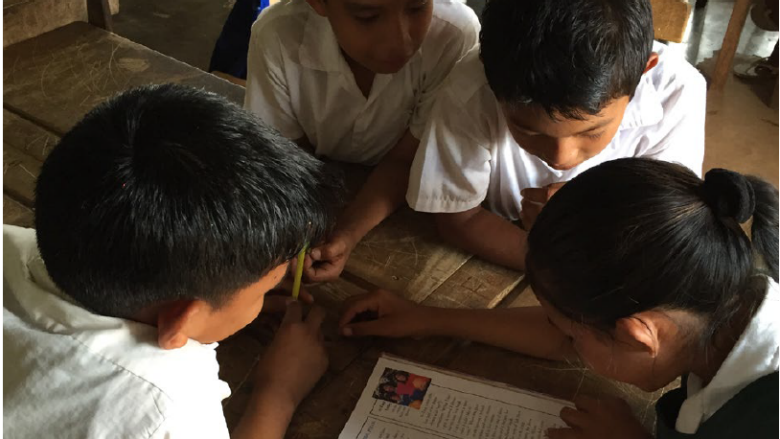Results
Between June 2015 and September 2018, over 8,700 nursery and grade 1 teachers and students benefitted from the project, 51 percent of whom were female. The project fostered improvements in ECE for Guyana’s most disadvantaged early learners, as evidenced by these outcomes:
As the first cohort completed its second year of nursery (June 2017), nearly 76 percent of students attained at least an “approaching mastery” level of emergent literacy, and nearly 82 percent of students attained at least an “approaching mastery” level of emergent numeracy.
The percentage point increases in emergent literacy and numeracy achieved by Hinterland students during the first cohort’s two years in nursery school were on par with those achieved by their peers in Coastal Regions.
For the second cohort, the 11- and 14-point gaps in the percentage of Hinterland and Coastal students attaining at least “approaching mastery” levels of literacy and numeracy were reduced to 2 and 3 percentage points, respectively.
At project close (September 2018), 526 nursery and grade 1 teachers had completed training in all topics included in three training modules. Trained teacher evaluations conducted during the 2016–17 academic year resulted in 54.5 percent of teachers attaining a rating of 3 or 4 (out of four) on the ECE Program Delivery Evaluation Checklist.
750 ECE Resource Kits were distributed to all nursery and grade 1 classrooms targeted by the project. During trained teacher evaluations carried out in 2016–17, 78.6 percent of teachers used the Resource Kit as part of their teaching plans, and 71.2 percent of the observed teachers scored either a 3 or 4 on proficiency in use of the kit.
A Parent Circle pilot was carried out during the 2016–17 school year. Led by 14 facilitators, sessions focused on engaging caregivers in 13 Hinterland communities in children’s early learning, benefiting 212 caregivers of children between ages three and six.
The Read-Play-Love mass media campaign, which included posters, brochures, DVDs, and radio and television advertisements, reached a nationwide swath of caregivers of young children. The campaign fostered a change in adult attitudes toward early education, as parents realized their own potential for encouraging and promoting their children’s learning at home.
Bank Group Contribution
The Guyana Early Childhood Education Project, through the Global Partnership for Education Trust Fund, received a grant of US$1.7 million to improve the quality of ECE offered to disadvantaged nursery and grade 1 students over three years. The World Bank served as the coordinating and grant agency for the trust fund, which is endowed by the governments of 20 countries: Australia, Belgium, Canada, Denmark, Finland, France, Germany, Ireland, Italy, Japan, Luxembourg, the Netherlands, Norway, the Republic of Korea, Spain, Sweden, Switzerland, the United Arab Emirates, the United Kingdom, and the United States.
During project implementation from 2015 to 2018, a Bank team effectively guided and supervised a small team within the Ministry of Education in all aspects of project coordination, monitoring and evaluation, and financial management and procurement duties.
Partners
As noted above, the World Bank served as the coordinating agency for the project’s US$1.7 million grant from the Global Partnership for Education Trust Fund.
Moving Forward
The Ministry of Education’s commitment to building on project achievements is evidenced by the following: (i) teacher training modules developed under the project are now incorporated into the standard training provided to new nursery and grade 1 teachers; (ii) funding is allocated to replenish existing ECE Resource Kits and to purchase new kits for nursery and grade 1 classrooms nationwide; (iii) funding is allocated to expand the Parent Circle initiative beyond the pilot and to provide oversight of new groups as they form; and (iv) the ministry maintains the Read-Play-Love website as an educational resource for caregivers of young learners.
Beneficiaries
Project beneficiaries include current and future nursery and grade 1 teachers who were and will be trained in pedagogical strategies for effectively delivering the newly designed nursery and grade 1 curriculum. Current and future nursery and grade 1 students are also project beneficiaries as they will be learning from teachers using interactive teaching methods and exhibiting a newly bolstered sense of purpose as educators. Finally, current and future caretakers who become more actively engaged in supporting their children’s learning are project beneficiaries, whether they participate in a Parent Circle group or are simply inspired by the empowering message of the Read-Play-Love media campaign.
